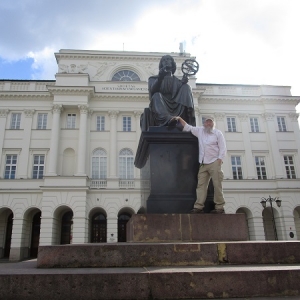University of Maine at Presque Isle Professor Kevin McCartney is an official Fulbright alumnus after spending nearly nine months in Szczecin, Poland as the very first Fulbright Scholar from northern Maine. During his Fulbright, McCartney undertook two large and several smaller studies connected to his research in the field of micropaleontology, delivered presentations in several Polish cities, taught a geology course, assisted student and faculty colleagues in writing English-language papers and grant proposals, and even named a new species in honor of his benefactor William Fulbright.
McCartney was one of 1,200 U.S. citizens to travel abroad during the 2016-2017 academic year through the Fulbright U.S. Scholar Program. Established in 1947 by U.S. Senator William Fulbright, the program has sponsored more than a million teachers and scholars in exchanges among more than a hundred countries. Fulbright participants are part of one of the world’s best known international academic exchanges, and take on the responsibility of serving as scholastic ambassadors among nations.
One of the many accomplishments of McCartney’s work in Poland was the description, in a paper soon to be submitted, of two new genera and two new species of silicoflagellates. One of the new species will be named Stephanocha fulbrightii, after the famous senator, as McCartney’s way of acknowledging support of his research. McCartney has previously named a genus after the University of Maine at Presque Isle and four species after students who worked with him at the University; a Russian colleague also has recently named a new species after McCartney: Nitzschia mccartneyi.
“Kewyn”—to use the name he commonly took while in Poland—served as both a teacher and researcher. His research in Poland, as it has been for the last 30 years, was focused on silicoflagellates. These single-celled, ocean-dwelling algae have geometric skeletons made of glass-like rods. In his decades of research, McCartney has studies silicoflagellates from all oceans and all significant intervals of geologic time over the past 120 million years, described five silicoflagellate genera and more than 20 species, and has about 50 micropaleontology papers in international journals and proceedings.
Much of his previous silicoflagellate research has been on more focused studies, such as an individual deep ocean drill core. The longer sabbatical provided by his Fulbright allowed him to expand the scope of this research to a more general understanding of silicoflagellates. During his time in Poland, McCartney studied the geological history of his group for the entire southern hemisphere, for the period of time from 65 to 50 million years ago. This is part of a larger project of developing an understanding of the evolution of the entire organism group.
Professor McCartney has a second large study in progress dedicated to the evolution of the silicoflagellate genus Naviculopsis, which has a long geologic history from about 58 to 18 million years ago. These silicoflagellates have fairly simple elongated skeletons, with the design occasionally occurring in other genus. McCartney is working with two students, one an undergraduate, on papers that clarify portions of this interesting evolutionary history. He is also working with a Chinese colleague on a paper about Ice Age fossils recently recovered from the Challenger Deep, which, located in the Pacific Ocean, is the deepest ocean bottom anywhere.
As a Fulbright Scholar, McCartney participated in a wide range of activities throughout northern Poland. These included visits to Poznań, Toruń, Gdańsk and several visits to Warsaw, where he did talks and interacted with other Fulbrighters. While in Szczecin, he assisted colleagues in nearly a dozen papers, grant proposals, and other activities at his host school, the University of Szczecin. He also taught a general geology course in Poland, participated in two workshops, and filled in for colleagues who were unable to teach classes.
He also continued his community service in Poland much as he does in northern Maine. He attended virtually every meeting of the local English-speaking Rotary Club, where he was active in two fundraising events and served as Santa Claus (Święty Mikołaj) at the Christmas party. While in Szczecin, his head was shaved as a part of Planet Head Day activities at UMPI, and he helped establish a group of people who plan to continue the event annually in Poland. His friends and colleagues in Poland include a variety of musicians or other artisans who kept him busy attending various functions.
McCartney observed that the city of Szczecin, while larger than Presque Isle, is similar in many ways: it’s located in the northwestern corner of the country very near the border with Germany.
“I found the people of Szczecin to be very similar to northern Mainers—hard-working and considerate. And as with northern Maine, Szczecin drivers generally stop for pedestrian traffic,” McCartney said. “I feel very much at a second home when in Szczecin.”
For several centuries prior to World War II, Szczecin was a part of Germany, and has much of the old German architecture and cobbled roadways. Photos of this and many other sights can be seen in the daily photo-blog McCartney maintained during his time in Poland. They can be viewed at http://wp.umpi.edu/kevinsfulbright.
McCartney will return to Poland for two weeks in August. He is an invited speaker at the International Phycological Congress, an event for the scientists who study modern algae. Also planned is a talk on astronomy informal education in northern Maine before a group that is working to establish a planetarium and Planet Head Day in Szczecin. McCartney is hoping to be able to find funding for another longer visit to Poland where he can continue his silicoflagellate research further up the geologic column to circa 50 to 30 million years ago.

